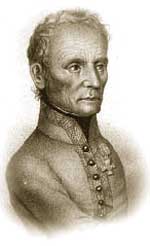Karl Mack von Leiberich

Østrigsk baron (Freiherr) og general. Stabschef for den østrigske hær.
- Neerwinden II, 1793
- Ulm, 1805
Mack, Karl, friherre M. von Leiberich (1752-1828), østrigsk feltherre, blev 1792 generalkvartermester og 1797 feltmarskalløjtnant, fik senere overkommandoen over den napolitanske hær, men flygtede 1799 til franskmændene og var en tid fange i Paris. 1805 anførte han den østrigske donauhær, men overgav sig i Ulm med 23.000 mand til Napoleon. (HK6/1923)
Østrigsk soldat, født ved Nenslingen, i Bayern, den 25. august 1752. I 1770 sluttede han sig til et østrigsk kavaleriregiment, hvor hans onkel, Leiberich, var eskadronchef, og blev udnævnt til officer syv år senere...... During the brief war of the Bavarian Succession he was selected for service on the staff of Count Kinsky, under whom, and subsequently under the comniander-in-chief Field Marshal Count Lacy, he did excellent work. He was promoted first lieutenant in 1778, and captain on the quartermaster-generals staff in 1783. Count Lacy, then the foremost soldier of the Austrian army, had the highest opinion of his young assistant. In 1785 Mack married Katherine Gabrieul, and was ennobled under the name of Mack von Leiberich. In the Turkish war he was employed on the headquarter staff, becoming in 1788 major and personal aide-de-camp to the emperor, and in 1789 lieutenantcolonel. He distinguished himself greatly in the storming of Belgrade. Shortly after this, disagreements between Mack and Loudon, now commander-in-chief, led to the formers demanding a court-martial and leaving the front. He was, however, given a colonelcy (1789) and the order of Maria Theresa, and in 790 Loudon and Mack, having become reconciled, were again on the field together. During these campaigns Mack received a severe injury to his head, from which he never fully recovered. In 1793 he was made quartermaster-general (chief of staff) to Prince Josias of Saxe-Coburg, commanding in the Netherlands; and he enhanced his reputation by the ensuing campaign. The young Archduke Charles, who won his own first laurels in the action of the 1st of March 1793, wrote after the battle, Above all we have to thank Colonel Mack for these successes. Mack distinguished himself again on the field of Neerwinden; and had a leading part in the negotiations between Coburg and Dumouriez. He continued to serve as quartermaster-general, and was now made titular chief (Inhaber) of a cuirassier regiment. He received a wound at Famars, but in 1794 was once more engaged, having at last been made a major-general. But the failure of the allies, due though it was to political and military factors and ideas, over which Mack had no control, was ascribed to him, as their successes of MarchApril 1793 had been, and he fell into disfavour in consequence. In 1797 he was promoted lieutenant field marshal, and in the following year he accepted, at the personal request of the emperor, the command of the Neapolitan army. But with the unpromising material of his new command he could do nothing against the French revolutionary troops, and before long, being in actual danger of being murdered by his men, he took refuge in the French camp. He was promised a free pass to his own country, but Napoleon ordered that he should be sent to France as a prisoner of war. Two years later he escaped from Paris in disguise. The allegation that he broke his parole is false. He was not employed for some years, but in 1804, when the war party in the Austrian court needed a general to oppose the peace policy of the Archduke Charles, Mack was made quartermaster-general of the army, with instructions to prepare for a war with France. He did all that was possible within the available time to reform the army, and on the opening of the war of 1805 he was made quartermaster-general to the titular commander-in-chief in Germany, the Archduke Ferdinand. He was the real responsible commander of the army which opposed Napoleon in Bavaria, but his position was ill-defined and his authority treated with slight respect by the other general officers. For the events of the Ulm campaign and an estimate of Macks responsibility for the disaster, see NAPOLEONIC CAMPAIGNS. After Austerlitz, Mack was tried by a court-martial, sitting from February 1806 to June 1807, and sentenced to be deprived of his rank, his regiment, and the order of Maria Theresa, and to be imprisoned for two years. He was released in 1808, and in 1819, when the ultimate victory of the allies had obliterated the memory of earlier disasters, he was, at the request of Prince Schwarzenberg, reinstated in the army as lieutenant field marshal and a member of the order of Maria Theresa. He died on the 22nd of October 1828 at S. Pdlten.